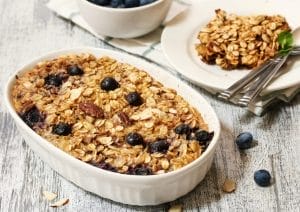Perhaps one of the most versatile grains, oats are a naturally gluten-free source of fiber, nutrients and brain-fuel. They have received considerable attention given their adaptability to be utilized as a breakfast food, baking ingredient and dairy-free milk alter native.
native.
New research and development onoat-based products have acknowledged their role as both a source of nutrition and for their health benefits. In decades past, oats have primarily been used for animal feeding and to a lesser extent, as a cereal grain. However, human oat consumption has been steadily increasing owing to the health benefits associated with the rich amount of dietary fibers present in the oat grain.
A 2015 article published in The Journal of Food Science and Technology, led by Dr. Alok Jha, reviews the nutritional advantages of oats. These oat fibers, such as Beta-glucans, are plant-based starches that are not digested or absorbed in the gut. Instead, they serve to nourish the gut microbiome, promote regular bowel movements, and decrease blood sugar and cholesterol levels. By acting as a bulking agent of sorts in the gut, the oat fiber has two benefits: it helps to maintain satiety and keep us full, all while regenerating the gut microbiome and contributes to a healthy gut-brain-axis. The gut-brain axis is a bidirectional communication system that links the nervous systems between the gut and the brain. These connections allow the gastrointestinal tract to influence mood, cognition, and mental health and vice versa.
 There is growing research to suggest that the microbial diversity in the gut changes as we age – with a loss of beneficial bacteria and a reduction in short-chain fatty acids that play critical roles in reducing inflammation. A 2020 study published in the Journal of Agricultural and Food Chemistry led by a team from China’s Soochow University demonstrates the utility of oat fiber to restore the microbiome and lead to cognitive improvements in an animal model system.
There is growing research to suggest that the microbial diversity in the gut changes as we age – with a loss of beneficial bacteria and a reduction in short-chain fatty acids that play critical roles in reducing inflammation. A 2020 study published in the Journal of Agricultural and Food Chemistry led by a team from China’s Soochow University demonstrates the utility of oat fiber to restore the microbiome and lead to cognitive improvements in an animal model system.
The team created a cohort of genetically modified mice designed to mimic similar characteristics of human dementia and studied the effects of oat fiber supplementation. They found that oat fiber increased the amount of short-chain fatty acids and improved overall microbial diversity in the gastrointestinal tracts of the animals. In addition, those who received oat supplements in their feeds had improved cognitive and memory testing.
In an article by the Harvard T.H. Chan School of Public Health, oat fibres help to prevent rapid increases in blood sugar levels that can occur following consumption of a carbohydrate-rich meal. As glucose is the brain’s primary source of fuel, it is crucial to maintain stable blood sugar levels throughout the day. In the presence of hypoglycemia (low blood sugar), the brain is temporarily deprived of fuel, leading to symptoms such as weakness, confusion, irritability and dizziness. On the other end, acute hyperglycemia can decrease our speed of information processing, memory formation and attention. Maintaining a fine balance is where the humble oat is powerful.
A 2013 study out of the Department of Nutrition and Food Hygiene in Beijing, China sought to investigate the role of oat intake on regulation of blood sugar levels in a group of 260 individuals with type-2 diabetes. Participants in the study were given a 30-day dietary intervention and were randomised into one of four groups. Along with a generally healthy diet, two of the groups received either 50 or 100 grams of whole grain oats. The other two groups had either no dietary change or followed a generally healthy, high-fibre and low-fat diet.
After completion of the month of dietary change, all three intervention groups demonstrated a reduction in post-meal blood glucose  levels in comparison to the control cohort. However, this effect on blood sugar was significantly greater with the larger, 100-gram oat supplement, suggesting a dose-dependent relationship between oat consumption and glycemic control. In addition, the participants in the high-dose group tended to demonstrate a modest weight loss up to one year following the completion of the study. These findings suggest that, in addition to a healthy diet, there may be a role for oats in the maintenance of our metabolic and gastrointestinal health. Oat fibres have a role not only in creating a tasty, nutritious and satiating meal, but also in regulating our microbiome.
levels in comparison to the control cohort. However, this effect on blood sugar was significantly greater with the larger, 100-gram oat supplement, suggesting a dose-dependent relationship between oat consumption and glycemic control. In addition, the participants in the high-dose group tended to demonstrate a modest weight loss up to one year following the completion of the study. These findings suggest that, in addition to a healthy diet, there may be a role for oats in the maintenance of our metabolic and gastrointestinal health. Oat fibres have a role not only in creating a tasty, nutritious and satiating meal, but also in regulating our microbiome.
Given the close relationship between brain health and gut health, oats are an emerging tool to support a healthy gut-brain-axis.
Check out our favourite Oat superfood recipes here >>




